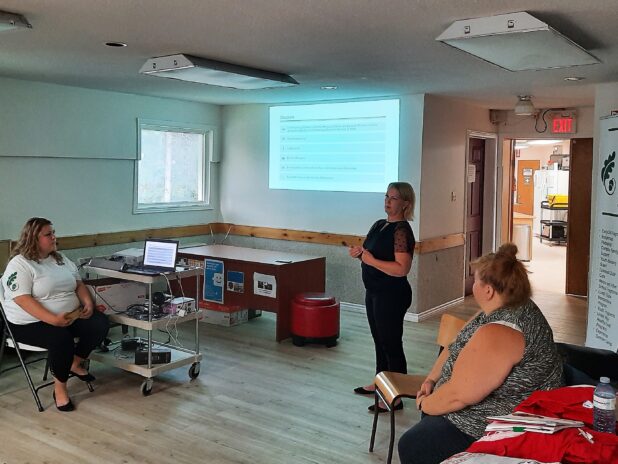Headline News
ECE information session held at Hub 168 on Aug. 17
August 26, 2022

By Mike Riley
Local Journalism Initiative Reporter
North Hastings Children’s Services and Loyalist College co-hosted an information session on Aug. 17 from 6 p.m. to 7:30 p.m. at Hub 168 to highlight the current shortage and need for qualified Early Childhood Educators and the program that Loyalist College offers to train those who are interested in pursuing this as a career.
Held at Hub 168 at 168 Hastings Road N., the information session featured presentations by NHCS executive director Jessica Anderson and early years manager Nicole Beaudin from NHCS and Lisa Woodcock, admissions/records and placement officer from Loyalist College. The session was to address the shortage of ECEs in the community and all across the province and to tell those assembled about the program and how rewarding a career as an ECE can be.
Anderson and Beaudin spoke first, telling those in attendance about NHCS, the role of the ECE and how in demand ECEs are, not only for NHCS but across the country.
Anderson said that NHCS was formed in 1989 to respond to a need for diverse childcare in North Hastings. It was the amalgamation of two other organizations; the North Hastings Children’s Resource Centre and Bancroft Children’s Centre. NHCS covers all of North Hastings, an area the size of half of Prince Edward Island.
“We are the only licenced childcare and early years provider in North Hastings at this time,” she says.
NHCS has a staff of 40 to 50 team members and their activities constitute a balance of licenced childcare, early years programs, the partnership with the Algonquin Inodewiziwin, the school readiness program, youth programs and community facilitated programs. They follow the Childcare and Early Years Act that is required by the MOE and under this Act they’re required to have a certain number of ECEs for a certain number of children, or they cannot operate.
Anderson says that since they really need ECEs, they’ll work with a good candidate to make it work with regard to hours, time off, salary, and benefits, if it’s the right fit.
The starting wage for an ECE now is $20.87 per hour with a $2 addition from the Ontario wage enhancement grant. When minimum wage goes up soon, there will be a fifty-cent increase, and with the introduction of the Canada wide Early Learning and Child Care system, it is expected that ECEs will be making up to $25 per hour within a few years.
“ECE is a career, it’s a profession. It’s intentional programming that happens with the children, like gardening and creative play. It’s not just an adult in a room keeping children occupied. There are no screens, there’s activity, there’s requirements to be outdoors for two hours a day or more. So, the quality aspect is about the relationship between the ECE and the child. They learn to play, it’s about learning with your co-educators and then when the ECE sees the learning, the children see the learning, and each area is intentional and focussed on development,” she says.
Woodcock spoke after Anderson and Beaudin, and explained the admissions requirements to the ECE program at Loyalist, the training needed, and the placements. There are a total of 26 courses to take (20 theory courses, three practicums and three electives) either in-person or online, part-time or full-time, and students have up to seven years to complete the program. A semester runs 14 weeks.
Overall, a grade point average of 60 per cent is needed to pass the ECE program and the application deadline for this coming school year is Sept. 12, but there are also start dates in January and May.
ECE grants and OSAP are available to help out with the costs of the program. The ECE grant is available from the provincial and federal governments to address ECE shortages across the province and since 2007, they’ve financially helped over 13,000 people achieve their ECE qualifications. OSAP is a financial aid program to help with college or university expenses by being able to procure a grant or a student loan. It helps with the cost of tuition, books and equipment, school fees, living expenses and childcare. They can be found at www.ecegrants.on.ca or at www.osap.gov.on.ca respectively.
The costs for the ECE program are $1725.29 if it’s done online (with an additional $277.20 if you want Loyalist to monitor your progress with the eLab option) and $2603 in-person.
“So, it’s quite a significant difference but it depends on the student and what works best for them. It’s really flexible and there’s lots of variety and choices that you can decide your own program as long as it’s within the time frame to complete it,” she says.
Anderson said that there’s a minimum number of ECEs required by the MOE and that NHCS wants to have all their educators be ECEs to improve quality for the children. She says they also want to expand to support the number of childcare waiting lists and to cover underserved areas and new initiatives like the childcare centre coming soon to Hastings Highlands.
“Although the communities lack the infrastructure, that’s outside of our scope. Infrastructure is County and Ministry but we’re the operator so we need to have the staff to support those programs and right now we’re struggling to do that. So, the more ECEs we can get to fill the demand, the better,” she says.
For more information on being an ECE with NHCS, email Beaudin at nbeaudin@nhcs.ca. For more information about Loyalist College’s ECE program, email Woodcock at lwoodcock@loyalistcollege.com or visit www.loyalistcollege.com.
Anderson told Bancroft This Week that she was impressed with the great turnout that night.
“There’s only a few of our staff and the rest are not. I’m happy it’s such a great turnout. Loyalist College has been fabulous in terms of looking at strategies to accommodate potential students and their schedules to get them into the program,” she says.
Woodcock also thought it was an excellent turnout.
“It shows that there is a genuine interest in our community to pursue a career in childcare and work toward obtaining their ECE diploma.”

















